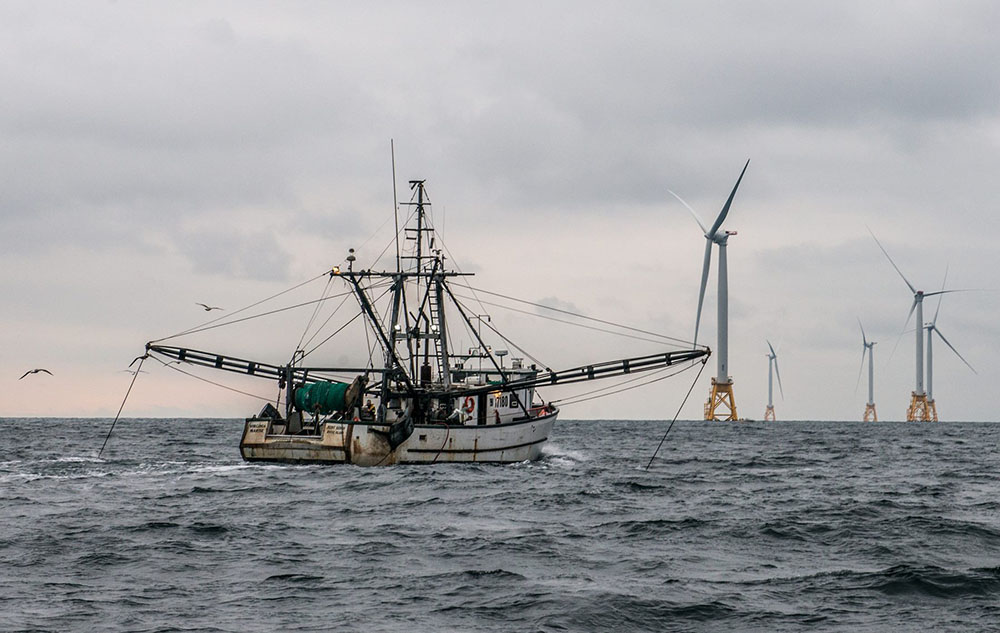With the public comment period closing near midnight Monday, advocacy groups for the offshore wind and commercial fishing industries marshaled their supporters for a last push to influence federal regulators on the future of the new power supply.
The Bureau of Ocean Energy Management closed the 45-day comment period on its supplemental environmental impact statement for the 800-megawatt Vineyard Wind project proposed off southern New England.
With the clock ticking to 11:59 p.m. July 27, a coalition of East Coast fishermen and seafood businesses called for a five-year moratorium on all offshore wind power development, until an array of issues raised by the fishermen’s coalition is addressed.
“All energy, including ‘clean energy,’ has environmental impacts that must be fully understood and weighed in the context of an overall power strategy. While protecting our air and climate is important, so is protecting marine ecosystems and biodiversity,” declared a preamble to an online petition circulating in recent days.
“The power density of offshore wind projects is among the lowest of any energy source, and the industrialization of such large areas will permanently change marine ecosystems and threaten a strategic food supply,” the group warns.
Among its list of a dozen industry concerns, the group says fishermen have been largely sidelined by BOEM and wind developers as more than a dozen East Coast projects were conceived.
“The fishing industry must be included early in the planning process of any offshore development project, and long before the point that a Construction and Operations plan has been finalized,” the petition states. “Our historic fishing locations and practices will be directly and permanently impacted by any offshore development, and every effort should be made to preserve and protect them.
“Any planned project will benefit from the expertise of our industry. So far, this has not occurred in any meaningful way.”
At a July 21 meeting in Boston with seafood industry representatives, U.S. Interior Secretary David Bernhardt assured them the Trump administration will listen to their concerns.
One of the fishermen's goals has been to require vessel transit lanes up to four nautical miles wide through the planned New England wind energy areas. A Coast Guard study navigation issues in the region, did not endorse that idea, instead favoring a uniform 1-nautical mile grid layout for turbine towers as proposed by Vineyard Wind and developers that hold nearby BOEM leases.
At the Boston meeting, Bernhardt appeared open to the idea of dedicated transit lanes.
“Let me put it this way, in the West, we do wind. You know where we don’t put a windmill? In the middle of a highway. You could drive all the roads of the west, and you’re not going to drive into a windmill in the middle of the highway,” said Bernhardt, according to Seafood Source.
That raised alarms among offshore wind power advocates. During the first of several online public hearings held by BOEM, Vineyard Wind supporters stressed the Coast Guard’s vessel access study findings and warned that setting larger traffic areas off-limits to wind development could threaten the financial viability of the project.
The Business Network for Offshore Wind issued its own call for supporters to make a last wave of comments to BOEM.
“The offshore wind industry is at stake and we need your help!” network president and CEO Liz Burdock wrote in a July 24 email to members.
“Some special interest groups are advocating for large chunks of development areas to be carved out to accommodate for larger transit lanes, in addition to what we have already removed,” said Burdock. “This would be detrimental to offshore wind lease areas and projects, and would compromise navigational safety, according to the U.S. Coast Guard. In addition, some members of the commercial fishing industry have very recently launched a petition for a five-year moratorium on offshore wind.”
"As you know, the offshore wind industry will be homegrown and provide the U.S. with thousands of new jobs and economic benefits. We need your help to voice support for the U.S. offshore wind industry," said Burdock. "Specifically, I’m asking you to submit comments to the Bureau of Ocean Energy Management, which is accepting comments from the public until 11:59 pm EST, Monday, July 27.”







